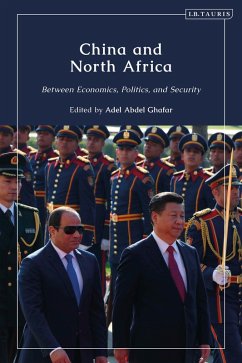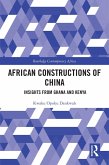As the United States slowly disengages from the Middle East and Europe faces internal challenges, a new actor is quietly exerting greater influence across North Africa: China.
Beijing's growing footprint in North Africa encompasses, but is not limited to, trade, infrastructure development, ports, shipping, financial cooperation, tourism and manufacturing. It is continuing to expand its co-operation with North African countries, not only in the economic and cultural spheres, but also those of diplomacy and defence. This engagement with North Africa relates to the key aim of President Xi Jinping's Belt and Road Initiative (BRI), which wants to connect Asia, Africa and Europe and sees potential in North Africa's strategic geographic location.
This book is the first to analyse China's role in North Africa. It comprises of five leading country experts - Anouar Boukhars, Yahia Zoubir, Sarah Yerkes, Tareki Magresi and Nael Shama - who examine the various socio-economic, political and security aspects of China's relationship with Algeria, Morocco, Libya, Tunisia and Egypt. The book explores how China is displaying a development model that seeks to combine authoritarianism with economic growth, a model and that has an eager audience among regimes across the MENA region. It reveals how the China-North Africa relationship fits within the broader dynamics of increasing China-US rivalry. In doing so, contributors explain why China's growing role in North Africa is likely to have far-reaching economic and geopolitical consequences for both countries in the region and around the world.
Beijing's growing footprint in North Africa encompasses, but is not limited to, trade, infrastructure development, ports, shipping, financial cooperation, tourism and manufacturing. It is continuing to expand its co-operation with North African countries, not only in the economic and cultural spheres, but also those of diplomacy and defence. This engagement with North Africa relates to the key aim of President Xi Jinping's Belt and Road Initiative (BRI), which wants to connect Asia, Africa and Europe and sees potential in North Africa's strategic geographic location.
This book is the first to analyse China's role in North Africa. It comprises of five leading country experts - Anouar Boukhars, Yahia Zoubir, Sarah Yerkes, Tareki Magresi and Nael Shama - who examine the various socio-economic, political and security aspects of China's relationship with Algeria, Morocco, Libya, Tunisia and Egypt. The book explores how China is displaying a development model that seeks to combine authoritarianism with economic growth, a model and that has an eager audience among regimes across the MENA region. It reveals how the China-North Africa relationship fits within the broader dynamics of increasing China-US rivalry. In doing so, contributors explain why China's growing role in North Africa is likely to have far-reaching economic and geopolitical consequences for both countries in the region and around the world.









